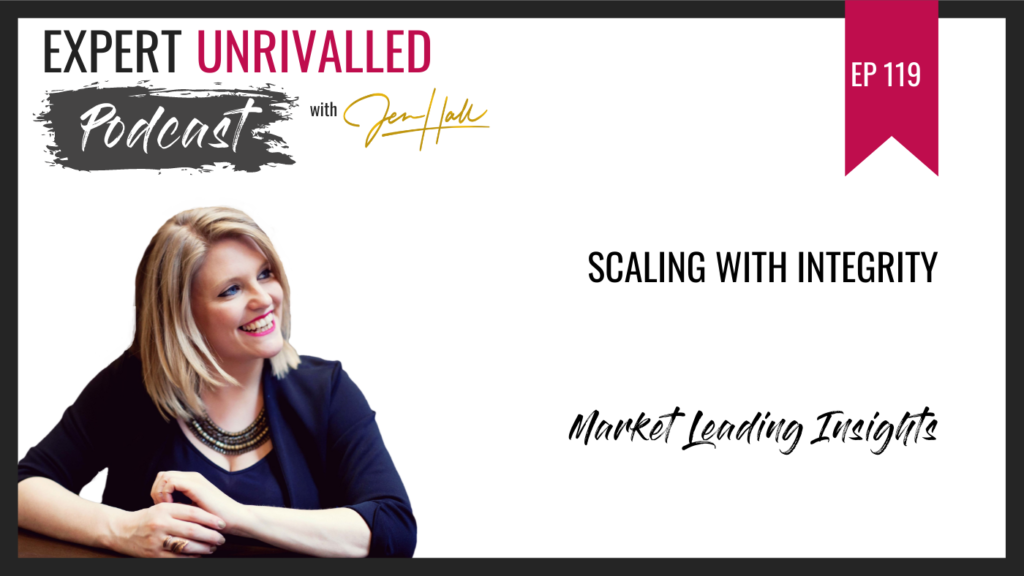If you are looking to scale the right way, then this episode is for you.
I’ll be covering what you need to do when you scale your business and some of the huge mistakes you need to avoid. Plus, why there’s more than one way to peel an orange and what the right way to scale with integrity is for your business.
If you are wondering whether it’s the right time for you to scale (or if it’s even too early) then listen to this podcast episode and find out.
Scaling With Integrity
This episode is important because I was listening to someone in the industry who I respect saying, ‘just put a course together, build a book funnel and go for it.’ And this annoys me because while this person has good intentions it is not about whacking together a course and putting it together on a funnel.
They make it sound so easy – like that is how it works. This is wrong from two perspectives. Firstly, the business does not make any money if you try to do this quickly without any forethought. It’s also a lot of effort to put something together that is unlikely to sell without the right foundations in place. Secondly, it does not do your client or your brand any good.
One of the best things you can do for your business is to start with a high-ticket programme. Now, there are always exceptions to the rule (and I work with exceptions to the rule). Every business is different. Yet, for most service-based businesses, starting out on a low-ticket automated programme is not necessarily the best way to go about it. Here is why.
1. It is too soon
For many new coaches, starting with a low-ticket programme that is automated is often too soon. Have you got a proven process? Do you have the results yet? I see people create courses and remove the live element completely and sell without this. For most people, if you remove the live element right away, you are not seeing how people interact with that programme. You do not see:
- How they react with the course
- The results they are getting
- Where they are getting stuck
- How they engage with the materials
Your clients can have a poor experience because it has not been tested.
2. You haven’t got a process
Another problem I see when people whack out a course is that they do not have a system or process in place. One of the first things you need to do before you think about scaling is to systemise your process. Extract the process of what you need to do.
When you first start out, you are often creating something bespoke. This is absolutely fine, but you also need to have a roadmap. Whether you sell 1-1, bespoke or courses, you need to systemise what you do so that people can see the roadmap. This way, people are not simply buying into you the person. You want people to buy into your solutions and process. Then you can extract the process and give it to people to learn or to others to teach.
It gives people trust in you that you know what you are doing. That you actually have a thought-out process. Then clients do not need to have you in the room delivering. And that system is proven, has got results and can show this.
3. 1-1 results do not always result in group results
Simply because you have got the results in a 1-1 setting, does not mean you will get the same results in a course or a programme. This is why it is great to get the testimonials and I strongly suggest when creating an online course, that you keep live elements so you are certain about what you are extracting.
There are so many times when I record content that I miss an element out. I either have to add those in or re-record. You rarely get it right the first time. It will take you around three times to get it right. You refine as you go and you will also need to update. A course is not a one-and-done thing – it is a craft.
4. You need to make sure you can sell it first
Before you create your course, make sure you sell it first. You need to make sure that you can sell it before you put time and effort into making it work. I’d also consider selling a live version of it first to make sure that people are buying into it and that it works. And that you have all the content that you need.
Your first few cohorts are your market research. They will be the people who make sure that your course is the best it can be and that you can develop on it.
Having a live element can also be a selling point, too. This depends on your goals – if you want to remove yourself completely so you can scale without you. There is no getting around that being live will help to sell the programme.
I find it interesting that people don’t want to do sales calls and just want to sell on webinars or messenger. Yet, it is proven that adding the option to speak to you, especially with high-ticket, will increase your conversions.
Think about the long-term
Many of these elements get ignored and you are spun this tale that you create a funnel then get out there and sell it. Actually, some people can be really good at this part. On the back end, it is not tested and people are failing. How will this fit your business in the long term? How will it help your clients that you are trying to make an impact on?
When people try to scale too fast, it will not do you or your business any good. It will be a flash in the pan. Prove the process, take the steps slowly, and show you are creating the best possible course for your audience. This is what will create the momentum of becoming a market leader.
There are whole Facebook groups of people who have done this and you’ll end up with a huge refund rate. Many online courses have a money-back guarantee and you are inviting those refunds if you are not ensuring the course is the best it can be.
There is no get rich quick scheme. When you buy into this way of thinking, you end up passing it on to those you are selling to. Let’s not create magic pills. Instead, let’s create impact and the best course it can possibly be.
Third-party credibility
Third-party credibility is when you get people sharing your business for you. This is when you become a market leader. You cannot force it to happen. It is an organic process when someone experiences a great service and product. This is how you grow your audience and reach a bigger market. You want people to be shouting about you and amazing testimonials.
I’m talking about real testimonials with real impact and outcomes. All of these need to be thought out.
Putting too much in
Another problem is that I see people packing too much into their courses. All that happens is it leaves people feeling completely overwhelmed and they cannot implement anything. They cannot see the woods for the trees. Your clients cannot see the path ahead.
There are some things that you cannot teach in a course. It needs to be 1-1. This is something a client was struggling with – they were trying to extract the process to put it into a step-by-step plan but it is not built for that.
Especially, if it is true coaching. Sometimes that cannot be given in a course and needs to happen in a 1-1 setting. It is not saying you cannot create a course but that some things cannot be replicated in a one-way system. You may have to have a live element in the online programme or a section of what you do is delivered in that course.
I do not buy into the idea that everything that everyone does can be packed in and put into a step-by-step plan. It depends on your niche, industry and what you are trying to teach. Sometimes it is about saying you can sell a specific part and outcome to people who are earlier on in their journey.
Other ways to scale
There are other ways you can scale. You do not necessarily need to scale with an online course. You can bring other people in to deliver. There are hybrid options where it is part course, part live. Don’t think that a digital course is the only and the best way to go. Sometimes it’s not and it’s about looking at what is best for your business and your client.
Have your client at the front. These are the people who will take your business the rest of the way for you. You have to make sure it is the best it can possibly be.
Course costs
Another aspect of this that annoys me is people putting on an arbitrary price but making zero changes to the product. Simply charging far more for it. Sometimes, it might be that course has been undercharged and therefore deserves the rise. But ultimately, it is not about charging what you are worth, it is about charging what the product is worth. This is key to take into account.
If you are looking to scale by raising your prices, it is always important to take into account what the product is worth. And if you have articulated the worth to justify what you charge.
I have heard people say: “my work is to be experienced, not explained.” As profound as this might sound, it is not the best way to go forward. You have to explain what you are doing and why your product and services are worth what you are charging. You need to be able to demonstrate the return on investment and value.
Absolutely, you should not get into the convince mode. You should be able to powerfully explain to the right people the value of your product. Putting on a random price because that is what everyone else is charging is not the right way to go about it.
You have to create a high-ticket offering and think about who you are selling to before putting a price on it.
If you are looking to scale with integrity by raising prices, do this in the right way.
High-Ticket Selling Series
Over the next 10 weeks, I am starting the High-Ticket Selling Series where I will be helping you create high-ticket offers and move forward in this space. So you can make more per client and get better quality clients in 2022.
If you are looking to jet-power your business in 2022, build a brand that is market-leading and scale it with integrity, then book a call with me.
Useful links:
Book a Call with Jen – bit.ly/claritycallpodcast
Download my FREE Seven Figure Market Leader Roadmap –http://www.marketleaderleague.com/marketleaderroadmap/
Send your emails to jen@jen-hall.com
Available on Apple iTunes, Spotify & Stitcher (Just search Expert Unrivalled Podcast)

